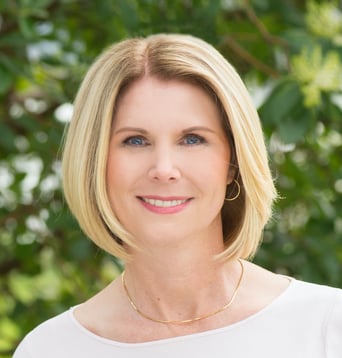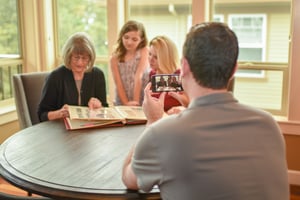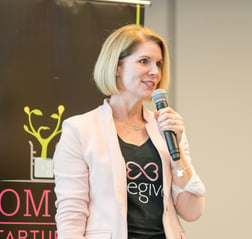Share this
Candice Smith, Founder and CEO, Caregiven
by Fundid on June 8, 2020
Candice has over 20 years of experience as a top-level fundraiser. In this capacity, she has secured million-dollar commitments, streamlined systems, and developed relationships and partnerships between institutions, donors, and communities.
Candice was inspired to start Caregiven following the death of her father in 2016. Her mission is to empower caregivers to navigate their loved ones’ end-of-life journey with focus and feeling, honoring wishes and reducing regrets. Caregivers gain guidance, tools, and a clear roadmap for the end-of-life journey of their loved ones, all in a powerful, easy-to-use app.
Q: If you could explain yourself in a couple sentences, how would you do that?
A: I've always been someone that both identifies problems and creates solutions for them; that person who steps up when no one else will. Because of that I’ve transitioned from a career in fundraising, to being a founder of a startup that will help families through a very challenging and heartbreaking time. Meanwhile, I'm fully embracing being in mid-life, trying to keep my family (including two teens) moving forward, educated and inspired to make their own difference in this world. 
Q: Will you tell me about your business and your role?
A: I founded Caregiven after caring for my dad during his end of life. Having gone through the experience of being a caregiver, I felt that there were ways in which we could improve the experience for other people, and so, that's really what we set out to do. As the founder and CEO, my role really is as the visionary leader, the passion behind this project, and it's my life's work now.
Q: How did you get into this business and what was the moment you decided to do it?
A: So I had gone through the experience of being a caregiver for my dad, and in the world's most perfect scenario. We had time, we had money, we had decisions, we were able to have conversations, and yet, when I would reflect at the end of every day, I would feel as if I was the first daughter to ever be losing her father. That made me just so angry, the fact that there was no normalizing context for caregiving. I would have these horrible thoughts that didn't make me a horrible person, but were just horrible thoughts, and I thought to myself, "I can't be alone in this, why isn’t anyone talking about it?”
My whole world sort of collided, I was under immense pressure at my work, my dad is dying, we’d moved back from Europe but my husband was still working there, so I was also a single-Mom to some degree; I was so overwhelmed in so many different ways. My husband and I had a conversation, and I said, "I'm going to quit my job. I've got to do something about this." And I like to joke, I love my husband, but he thought I was going to write a blog with some pretty pictures and get it over with. Three years and several thousands of dollars later, we have this amazing caregiving vision, a platform, and mobile app, really aligning the idea of emotional AI to help women like me, and men, who are caring for people with a limited lifespan.
Q: Can you tell me what your first year was like?
A: So my first career was in nonprofits. Alumni relations, fundraising, databases, and systems. I have never worked in the for-profit world. I had never heard all of the military terms about deploying this, and all of the vernacular that goes around with being a startup founder. So my first year, really was me constantly second-guessing every aspect. I felt like an imposter in every conversation that I was having, but I just knew I had to keep taking a step forward, and forward, and forward. That first year was educating myself on lean startup, business practices, and business plans, while also trying to wrap my head around the pains that we were trying to solve.
I would say that first year also was complicated, and I would suspect other female founders, particular solo founders like I was at the time, feel this way. We were trying to solve really human issues in an inhuman space of venture capital and technology. As a female founder trying to come to terms with how those two worlds work, they're not pieces in the same puzzle, but you have to make them fit to move forward. Also that first year when I was talking about this company, people were validating it, "Yes, this is important. Yes, this is important," so I think that that's what kept me going, even though every day, I felt like a fraud.
Q: So was there anyone in particular that inspired you or encouraged you to become this business owner?
A: Well, my dad, and my mom to a certain extent, in the sense that I was raised from day one, to always be “the somebody.” We've all sat in these meetings around the table and it's like, "Somebody needs to fix this; I wish somebody would fix that." My whole family ethos has always been "Okay, if nobody else is going to go beyond identifying the problem to solve it, I will be that person."
And then, every person I would speak to about my experience, my vision - they inspired and encouraged me, validating they’d felt the same pains. I don’t consider myself a business owner; I’m a steward of a collective vision to create a digital solution to help people. The fact that there is a business wrapped around that is ancillary.
Q: How do you define success for yourself, both personally and professionally?
A: I feel that with Caregiven, I'm so able to define success, even though we're pre-product. When I talk about my company, there's that immediate personal connection that resonates, and that's where I feel the success lies. If I don't have to explain the pain that we're trying to solve, that it's understood, and that that person immediately is grateful that Caregiven is trying to create that product, that is success to me.

I went through a strategic brand positioning, and that was one of the questions, "How will you know that you're successful?" I said that, "The true measurement of success will be when somebody refers Caregiven to me, not knowing that it's my company." Like when I'm on Facebook, and I say, "My uncle is sick, or my mom," and somebody says, "Oh, there's this great product," that will be the epitome of success. I don't want success or anything attributed to me, but to the work that we're doing.
So even in my personal life, I felt successful when my kids learned to tie their own shoes. It wasn't me teaching them, they achieved that milestone, and I was part of that journey that helped them grow and learn but it feels better when the success is someone else’s.
Q: What has been the most important skill that you have developed to be a good business owner?
A: Resilience. I think that is the most important skill that a business owner can have. It really isn't survival of the fittest, it's just who can survive, who remains true to that passion, despite other things trying to draw you away. In our case, we're a very caregiver centered product that we're trying to sell to enterprises, and they have their own ROI and cost savings that they're looking for. That almost broke me last year; I didn't want to play that game. But staying true to the pain and the why to see that the end justifies the means, is what I think is the greatest skill I've learned since founding this company.
I would also say the best thing a business owner can do is really embrace the idea and understanding of social capital and networking, and that it's not always about you or your company, but it's about the greater good. I don't know how many times I've had conversations with potential investors who I know immediately aren’t a good fit, but when I start pivoting the conversation to, "What type of companies are you looking to support? Oh, you're really interested in marketplaces. Let me tell you about these founders that I know..." all of a sudden, my social capital as a connector is on their radar again, but I'm also opening doors for other people that wouldn't have had that introduction. If I could imbue that skill in the other business owners, it would be paying it forward, and paying it laterally, even when the door shuts in your own face.
Q: Have you ever thought about quitting? If so, can you tell us the story?
A: I almost wrapped it up in December of last year. I had set some goals in January of 2019, and it was simple: I need to move this company forward in some way, shape or form. To move it forward, I needed to have a co-founder, or have an investor, or have a product. Now, I didn't have the money to build out the product, so you need the investor, and I'm also not a tech founder, I needed a tech founder so that I could raise the money to build the product. But I'd spent a whole year pushing hard, getting doors opened, amazing doors opened to me, but at the beginning of December, I felt my company was in the exact same position it had been 11 months prior. I changed my desktop screen to say something like, "Know when to say when."
Seriously, I had started canceling subscriptions for Zoom and professional membership, thinking about what jobs I was going to apply for. But I had said the decision comes December 31st.
In the first week of December, when I was at rock bottom, “alone” in this startup, this vision and I got selected to do Pitch Oregon. That night after presenting, I received notification of my acceptance into the Global Insurance Accelerator. It was the validation point that I needed to continue. I wish I could say that I dug down inside me and said, "I've got another six months in me." The answer was, I needed somebody else to say, "Yes, you need to keep going," and that was the Global Insurance Accelerator.
Q: What makes you want to keep going when you feel like quitting, or what do you do when it feels hard to be a business owner?

A: I talk to people about my vision, honestly and truly, because it's hard right now. I mean, the whole world is going to hell, and I
have a product that can help families who are trying to care for their loved ones without being close to them, but it's not yet to market. I feel like I've got this vision and this mission, and I can't keep going, but I have to keep going. When you want to withdraw from the world, and sit around and lick your wounds, that's the point where I realized I actually need to be reaching out into the world, and communicating more. And so, that's what I do. I pick up the phone and connect with mentors, advisors, fellow founders, and ask "Hey, can we just talk through this?" or I hear of someone who is caring for a loved one and while I don’t yet have a thing to give them, I can leverage my network to help them.
I try to enlarge my community of stakeholders around me, because that momentum gives me the encouragement to keep going, because it's not like I'm keeping going for me, I've got this whole community around me. Which again, is another female thing, right? You build your tribe, and then you are committed to showing up to the tribe authentically, and that can be, "I feel like I'm a failure, but how do I get beyond this?" and the tribe responds.
Q: What does the future of Caregiven look like?
A: First is getting this product released and in the hands of people who need the type of guidance and support that we're offering. The two things that I want to accomplish as a founder of this company are to prove that the most meaningful way to support individuals who are caring for an aging or ailing loved one, is to focus first on the emotional journey, and then overlay the physical, practical, and tactical on top of that. So that's the first thing I want Caregiven’s future to hold.
The second thing is that we can use technology like Caregiven, to help people be more human, to be more culturally appropriate, and really break down the disparities in all of the systems, not just health and financial systems. For example, how can we create a product that speaks to that first generation American whose parents still speak, Russian let's say, and their child is trying to help them navigate this end of life process, and our health system is saying, "You need to ask this," and it's culturally inappropriate. I want to use technology to really help people where they're at. And once we're able to do those two things, I feel like we’ve changed the future of care.
Q: Last question: What would you want to learn from a community of other women business owners?
A: I think that what I'm seeking most, and what I found in the first Flight Crew facilitated by Patience was to be amongst other women who are doing the best they can, who show up even when they are most vulnerable. I’m done with the good-old-networking ways, where you put on a facade amongst people you don’t know so that they see you a certain way. I love learning peer to peer, with the fact that we are all amazing women trying to do extraordinary things during a crazy time in the world or in our own lives as the common thread.
It may just be a midlife thing, but until we start talking honestly and openly about how our feelings are affecting our work, or how our work is affecting our feelings, I don't think there's going to be the movement that we, as women business owners want. And so, that Flight Crew was what I wanted from a community. Everybody was just there, life is not good outside of our four walls, and that comfort and the realness in that is what I want from a community of women business owners. I don't need more opportunities to prove that I've got my shit together; I need more opportunities to learn and hear from others on how they are working through their challenges, and how I can support them, or just be quiet and listen.